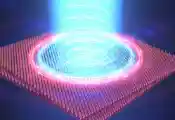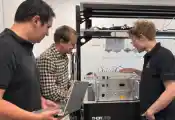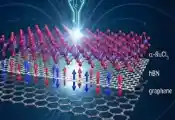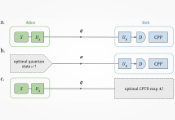Quantum Computer Simulated on a Supercomputer
Jülich, December 17, 2024 -- For Dr. Dennis Willsch (JSC), the type of processors used for JUPITER calculations is of secondary importance: “Our simulations can run on any computer that has a Fortran compiler installed – even on a standard laptop.”
Nevertheless, the physicist typically uses high-performance computers to run JUQCS. This is software that can be used to simulate universal quantum computers. These machines use the exotic rules of the quantum world to solve specific tasks faster than a supercomputer – at least in theory. For example, the Shor algorithm, which can be used to crack certain encryption systems, should be calculated in no time at all by a quantum computer.
In practice, however, there is no machine yet that has enough qubits for this task. A qubit is to a quantum computer what a bit is to a conventional computer.
Another problem is that “in the existing prototypes of quantum computers, many errors occur in the qubits. We therefore simulate these quantum computers under ideal conditions on normal computer systems. This shows us what the result should look like in theory, and we can use it to assess the quality of the real result,” says the physicist. However, there is a limiting factor in the simulation – the memory of the computer on which the simulation is run. “The memory is the real sticking point,” says Willsch. “And the memory requirement grows exponentially – it doubles for each additional qubit.”
A laptop can handle about 32 qubits with its memory. The record on a supercomputer is 48 qubits. JUPITER has enough memory to add a few more qubits to the simulation, says the researcher. “On an exascale computer, we could surpass the threshold of 50 qubits. That would be a new world record.”
The Nvidia GH200 superchip combines fast memory on the GPU side with energy-efficient main memory on the CPU side. Thanks to the integrated architecture, it is possible to use both memory areas homogeneously. The Booster module is therefore able to provide over 5 petabytes of memory that can be used by applications. This is equivalent to almost 650,000 standard laptops.




































